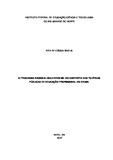O Programa Nacional Mulheres Mil no contexto das políticas públicas de educação profissional no Brasil

Visualizar/
Data
2017-02-20Autor
Rocha, Rita de Cassia
http://lattes.cnpq.br/6940678320234781
Metadado
Mostrar registro completoResumo
The Women´s National Program “Mulheres Mil” is analyzed in the context of the
national public policies of Professional Education and it was verified which advances
and challenges were accomplished, considering the field that it has been defining,
namely, the extension of the civil rights, with the Professional Education as an
important dimension of the construction of the citizenship. The proposal of the
Women´s National Program “Mulheres Mil” is to offer the bases of a social policy of
inclusion and gender for women in situations of social vulnerability. It was initially
implemented as a pilot project in 13 states in the North and Northeast of Brazil,
through a partnership between Canada and Brazil in 2007. In the end, it became a
public policy that is part of the “Brasil Sem Miséria” (Brazil without deprivation)
Program of the federal government, and it is implanted in the campuses of the
Federal Network of Professional, Scientific and Technological Education of Brazil.
This research is based on the understanding of an educational project capable of
facing the new challenges imposed by the present time, supported by an education
that changes the meanings towards social and economic transformations. Therefore,
it deals with an education whose paths turn to human emancipation, by anchoring
itself to the historical materialism as a theoretical background to approach the
problem in its totality and uniqueness. The contributions come from the authors who
discuss the relation between work and education, since it involves the historical
process, the appreciation of the instruments that legitimize the political action of the
State towards education and the perception of the social actors involved in it. The
investigative course comprised bibliographical and documentary research.
Complementing the empiria, semi-structured interviews with graduate women from
the Program at the Federal Institute of Education, Science and Technology of Rio
Grande do Norte (IFRN) were performed. The study is based on a historical
approach to the educational policies in Brazil, with a perspective in the vocational
education for women, based on the understanding of the formation of the Brazilian
State and its relationships involved in the corporate project, as well as the
understanding of the education´s role. Following that, the Program is presented in the
context of the Professional Education policies, in the scope of the public social
policies, explaining how its conception was elaborated in relation to the context in
which the public policies were conceived in the Brazilian State, considering the post-
1990s time lapse. As a next step, we analyze the interviews, emphasizing the
experiences and daily situations of women from the IFRN, which point to the
conception of Professional Education defended by them as a way of highlighting the
advances and challenges of this policy in the dimension of their citizenship
construction. We consider that the genesis of the Program is based on the ideology
of employability, but the operationalization in the school space brought unfolding
aspects that contribute to the emancipating human formation, since there are
elements of recognition of basic rights necessary to the exercise of citizenship.
Keywords: Professional Education- Public policies. “Mulheres Mil” National Program.
Citizenship.



